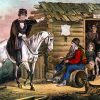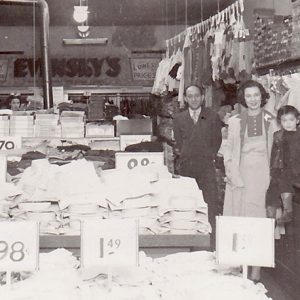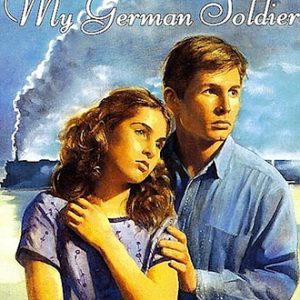calsfoundation@cals.org
Summer of My German Soldier
Bette Greene’s Summer of My German Soldier is a novel and a television movie set in eastern Arkansas during World War II. Both portray the Arkansas location, era, and characters realistically. Since the novel’s publication in 1973, it has remained a young-adult best-seller and is considered a classic of young-adult literature. In 1973, it was an American Library Association Notable Book, a National Book Award finalist, and one of The New York Times’s Outstanding Books of the Year; it also won the Golden Kite award. In 1979, the movie earned Emmy nominations for Outstanding Drama and Outstanding Writing. Esther Rolle won the Outstanding Supporting Actress Emmy for her portrayal of Ruth. Rolle praised Greene for her skillful, true-to-life characterization of Ruth.
Greene was born Bette Evensky in Memphis, Tennessee, on June 28, 1934. Her maternal grandparents lived in Memphis; her paternal grandparents lived in Wynne (Cross County). Her parents lived in Parkin (Cross County), where they owned and operated a general store. They were the only Jewish family in town, a fact that influenced the plot and themes. Bette spent her formative years in Parkin before marrying Donald Greene, a physician, in 1959 and moving to Brookline, Massachusetts. Greene was thirty-eight when she wrote the novel in conjunction with a Harvard University writing course she was taking in 1972; she received only $1,000 for it, not counting royalties. Greene died in 2020.
The novel is set during World War II in a small Arkansas town called Jenkinsville. Patty Bergen, the central character, is a tomboyish twelve-year-old who is out of school for the summer. Patty feels lonely: Her parents are unaffectionate and critical of her appearance and behavior, and, as a member of the town’s only Jewish family, she often feels disconnected from her Christian friends who enjoy church-related activities such as Bible camp. Not far from Jenkinsville is a prisoner-of-war camp holding German soldiers being used as day labor on local farms. When the prisoners are brought into the Bergen family’s store to buy hats to protect them from the sun, Patty converses with one of them, Anton Reiker. He impresses her as kind and charming. After Anton escapes from the camp, Patty conceals him from search parties. When she is found out, her family is humiliated, and the court sends her to reform school. Ruth, the family’s housekeeper, loyally stands by Patty; in the novel, she visits Patty in the “Arkansas Reformatory for Girls,” consoling her and convincing her that she is a good person who will see better times. In the movie, she walks with Patty through downtown Jenkinsville, bravely shielding her from the ostracism of the townspeople.
The novel is historically accurate in its depiction of a small town in Arkansas during World War II. Because the Bergen family is Jewish, the novel reflects not only the average American’s anxiety about the military struggle against Germany but also concerns about Adolf Hitler’s victims in Europe. Religious, racial, and ethnic tolerance in this Arkansas community is evident but depicted as strained: Chu Lee, the Chinese grocer, is referred to as “the Chink,” and his store is vandalized, apparently from misdirected war-time hatred of the Japanese; Mrs. Benn, the minister’s wife, refers to the Jewish Bergens as “you people” and their African American housekeeper (Ruth) as “uppity.”
Some names from the author’s real life have been changed. “Bette Evensky” is changed to “Patty Bergen,” for example, but Ruth’s name is unchanged. Place names sometimes are unchanged (Jonesboro in Craighead County, West Memphis in Crittenden County, and Memphis), slightly changed (Wynne becomes Wynne City), or completely changed (Parkin becomes Jenkinsville). A prisoner-of-war camp was actually located near Wynne, ten miles from Parkin. Similar to Patty’s experience, Bette encountered German prisoners of war in her family’s store and felt uncomfortable being Jewish in a predominantly Christian town. But Bette never aided an escaped German prisoner.
Summer of My German Soldier was adapted for television by Jane Howard Hammerstein, with Greene acting as consultant. It premiered on October 30, 1978, on NBC as a production of Highgate Pictures, a division of Learning Corporation of America. Its cast included Kristy McNichol as Patty, Rolle as Ruth, Bruce Davison as Anton, Michael Constantine as Mr. Bergen, and Barbara Barrie as Mrs. Bergen. The film follows the novel closely except for minor changes, mostly omissions and a few substitutions: The book concludes with Patty in reform school, but the novel ends with the dramatic walk with Ruth through downtown Jenkinsville.
The novel is valued for its poignant depiction of a young girl surviving isolation from community and family. The irony of a Jewish girl’s sheltering a German during the era of the Holocaust is rendered believable by the fact that she is a lonely girl bonding with a kind German who is lonely, isolated, and persecuted. The emotional support provided to Patty by Ruth—a black house servant in the era before civil rights in America—makes the story a powerful statement about courage and dignity in the face of alienation and adversity. Some of Greene’s most ardent fans are readers who felt alienated as children. Many readers thanked her for helping them through a difficult childhood, for helping them see that they were not alone in feeling friendless or unloved.
Although Summer of My German Soldier is a perennial best-seller in young-adult fiction, it is one of the most banned books, ranking eighty-eighth on the American Library Association’s “The 100 Most Frequently Challenged Books of 1900–1999.” A “challenge,” which is any formal complaint aimed at preventing others to have access to a book, can be made for any reason. The most frequent complaints against Summer of My German Soldier concern the conclusion—Anton’s death and Patty’s punishment. Greene considered the conclusion to be socially and psychologically realistic, but the challenges have portrayed it as “pessimistic” or “unsuited to the age group.”
Morning is a Long Time Coming, the sequel to the novel, was published in 1978 and follows Patty’s story after high school. Now eighteen, she travels to post-war Germany to visit Anton’s mother more than six years after his death. It is a journey of self-discovery and healing that includes reflections on the Holocaust. En route, she has a coming-of-age romance with a young Frenchman.
For additional information:
D’Armond, Charlotte Dawn. Young Adult Novels into Television Films: A Content Analytic Study. Baton Rouge: Louisiana State University and Agricultural & Mechanical College, 1984.
Greene, Bette. Summer of My German Soldier. New York: Puffin Books, 1999.
Osa, Osayimwense. “Adolescent Girls’ Need for Love in Two Cultures—Nigeria and the United States.” English Journal 79 (December 1983): 35–37.
———. “The Representations of Cultural Mechanisms, Manipulations, and Processes in Children’s Literature: The Bride Price and Summer of My German Soldier.” Compar(a)ison: An International Journal of Comparative Literature 2 (1995): 81–99.
“Summer of My German Soldier.” Internet Movie Database. http://www.imdb.com/title/tt0078341/ (accessed March 27, 2024).
Troy, Anne, and Phyllis Green. Teacher Guide: Summer of My German Soldier. Palatine, IL: Novel Units, 1994.
Robert Lamm
Arkansas State University
 Arts, Culture, and Entertainment
Arts, Culture, and Entertainment Civil Rights and Social Change
Civil Rights and Social Change Literature and Authors
Literature and Authors Bette Greene Family
Bette Greene Family  Summer of My German Soldier
Summer of My German Soldier 



My mother told me about this a long time ago. She lived in Wynne, AR, and my father’s family lived in Parkin, AR. My grandfather had a dry cleaners on Front St. and my great-uncle had a barbershop. My mother said girls would walk around the POWs and they would whistle at them.